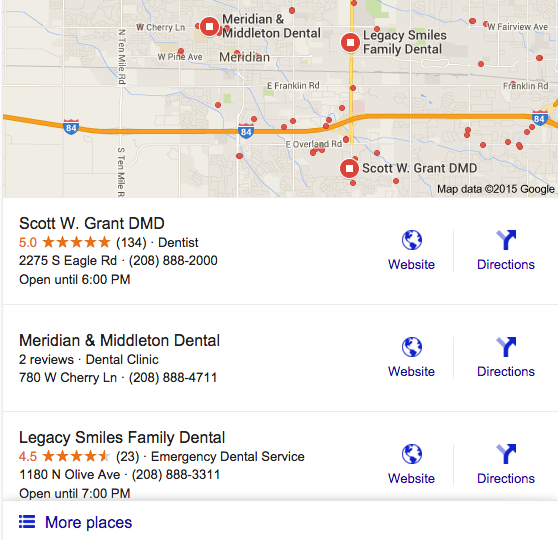How often do you think about your practice’s online reviews? Do they keep you up at night, or do you ignore them out of convenience? Or maybe your patients consistently love you, so you don’t worry too much about what they’re saying online. Online reviews for dentists are now more important than ever.
Online reviews for dentists are now more important than ever.
Before someone becomes your patient, they’re probably going to research you online. That means visiting your website, reading your blog, checking out your social media presence, and reading your reviews on third party review sites.
Since those review sites often come across as “authentic” and “unbiased,” they’re often the first place your potential patients look when they’re trying to find a new dentist.
What Your Patients See
Even if they don’t head straight for Yelp, people are confronted with online reviews immediately when they searchfor a local dentist.
Here’s a quick screenshot of my search results for “Meridian dentist”:

Notice how two of those results on Google’s local “three-pack” at the top of the page look much better than the other one? That doesn’t necessarily mean Meridian & Middleton Dental provides bad service– it just means they have fewer Google reviews than the other two practices.
Potential patients are confronted with those 5 stars right when they search, and they look pretty appealing from the get-go. Where do you think they’re likely to click?
Their research is going to start with one of those first two results. They might read those Google reviews, or they might just click over to one of the websites. Either way, they’ve found a strong candidate for further research.
The Numbers Don’t Lie
So, how many of your potential patients are actually swayed by those online reviews? It’s a bigger number than you might think.
According to a study from digital marketing giant, Moz, 67% of consumers are influenced by online reviews.
From the article:
The results of the study show that online reviews have a significant influence on the decision-making process of consumers. The data supports the fact that Internet users are generally willing to look at the first and second page of Google search results when searching for details about a product or company.
We can also conclude that online review sites like Google+ Local are heavily visited by potential customers looking for information, and the more negative content they find there, the less likely they will be to purchase your products or visit your business.
If they’re interested in your practice, a potential customer might move well beyond the first page of search results to perform in-depth research. If they find multiple pages with bad reviews, this data suggests they’ll move on to another practices and find a new dentist someplace else.
The data shows your potential patients are mostly looking to Google’s local reviews when they’re seeking information, but many check Yelp, as well. If your reviews look consistent across the board, they’re likely to pay more attention to your website or even give you a call.
Don’t (Always) Sweat the Bad Ones
But you can’t please everyone, right?
Consistent bad reviews are bad news, especially if they’re spread across Google, Facebook, and Yelp. If those negative reviews all mention the same thing, such as an unfriendly receptionist, attempts to oversell patients on procedures, or long wait times, you’re probably sunk.
An occasional bad review might not be the end of the world, though. Spiegel Research Center’s study shows many consumers prefer an overall 4.5 star review score to a 5 star review score. 80% of consumers seek out negative reviews and, if you only have one or two, they’ll move back to the positive reviews with a renewed feeling of authenticity.
Sometimes you’ll encounter a patient that’s hard to please, or even perform a tough procedure when they’re already having a bad day. Those circumstances might end with a negative review, and that’s okay. Having an overall score of a little less than 5 stars leads your potential patients to believe your reviews aren’t “too good to be true.”
If you let the bad reviews get out of hand, though, it could spell a big loss in profitability.
From Moz’s research:
If three negative articles pop up in a search query, the potential for lost customers increases to 59.2%. Have four or more negative articles about your company or product appearing in Google search results? You’re likely to lose 70% of potential customers.
If you’re ignoring your online reviews, those bad reviews can build up quickly. If you’re seeing consistent patient complaints, it’s time to fix the problems on your end and work on earning more positive reviews for your practice.
As a dentist in the modern world, online reviews are a big part of your reality. Your potential patients are researching you online, and those reviews have a big impact on their buying decisions. It’s up to you to monitor your reviews, address the negative feedback, and work on earning a greater number of positive reviews.
To your marketing success!
-Brodie
